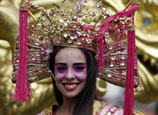
If nothing else, presence of Hollywood actors signifies the rising role of China in the global marketplace. Top Western actors are no strangers in Feng's films — Donald Sutherland previously starred in his "Big Shot Funeral" in 2008.
"Back to 1942" is an interesting film, especially from production viewpoint. For instance, the very subject matter, hunger – still a vivid memory in the Chinese national consciousness – is depicted in unflinching details thanks to an astronomical budget (an estimated US$35 million).
"1942" is also an atypical film, at least by Hollywood standards, in that every single dollar spent on the film recounts and honors the hardships of poverty and starvation. The focus on two families, one rich and the other poor, and their levelling during the famine foretells the impending "egalitarianism" of Mao, who rose to power few years after the shortage of food ended.
Compared to your average CGI-inflated blockbuster, "Back to 1942" scores in its meticulous attention to detail — everything from costumes to make-up do not shy away from displaying its generous budget. However, despite investing considerable creative energy and capital in the representation of hunger and deprivation, the film fails to convey human suffering on an emotional level. It will be very interesting to see how the film performs on American screens since hunger, in Hollywood as well as in modern China, is a taboo almost on a par with sex.
The November issue of the British trade paper Screen explores how Chinese studios are no longer willing to provide low-cost outsourcing, instead expressing their determination to play a leading role on the international scene. Judging from the lavish and sumptuous production of "Back to 1942," one can only take note of the radical financial shift now sweeping through the global film market.
Giovanni Vimercati is a freelance film critic, founder of the Celluloid Liberation Front and critical analyst of world politics. @CLF_Project
 |














 Solar yacht put into use in SE China
Solar yacht put into use in SE China


![]()
